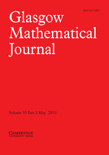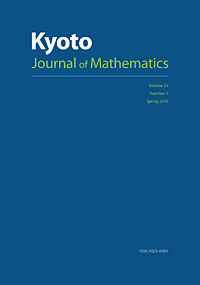
Categories and General Algebraic Structures with Applications
Scope & Guideline
Bridging Theory and Application in Mathematical Research
Introduction
Aims and Scopes
- Algebraic Structures:
The journal emphasizes the study of diverse algebraic structures such as semigroups, lattices, and groups, exploring their properties and interrelations. - Category Theory Applications:
Research often integrates category theory, providing a framework for understanding algebraic structures and their morphisms, enhancing theoretical and practical applications. - Topological and Order-Theoretic Aspects:
A consistent focus on the interplay between algebraic structures and topology or order theory, examining how these domains inform each other. - Interdisciplinary Approaches:
The journal encourages interdisciplinary research that connects algebraic concepts with other areas of mathematics, such as logic, topology, and combinatorics. - Innovative Methodologies:
A commitment to new methodologies in the study of algebraic structures, including advanced techniques in homotopy theory, duality, and categorical constructs.
Trending and Emerging
- Advanced Homotopy Theory:
An increasing number of papers are delving into homotopy theory, reflecting its growing importance in understanding complex algebraic structures and their interrelations. - Quantum Algebra and Topology:
Emerging research in quantum algebra, particularly in relation to ribbon categories and quantum determinants, showcases the journal's engagement with modern theoretical physics and algebra. - Categorical Dualities and Extensions:
There is a notable trend towards exploring dualities and extensions within categorical frameworks, indicating a deeper investigation into the foundational aspects of category theory. - Applications of Algebraic Structures in Other Fields:
Research that applies algebraic structures to areas such as computer science, logic, and combinatorial mathematics is on the rise, illustrating the relevance of algebra in solving practical problems. - Complexity in Algebraic Models:
Recent trends show a focus on complex algebraic models, including cubical structures and multi-ring theories, which suggests a shift towards more intricate systems within algebra.
Declining or Waning
- Classical Algebraic Structures:
Traditional studies focusing solely on classical algebraic structures such as groups and rings are becoming less frequent, possibly due to the increasing interest in more complex and higher-dimensional structures. - Basic Topological Properties:
Research centered on elementary topological properties of spaces related to algebraic structures is waning, as more researchers are exploring deeper, more abstract relationships. - Elementary Category Theory:
Basic discussions and applications of elementary category theory are decreasing, as the field is moving towards more sophisticated applications and developments.
Similar Journals

RENDICONTI DEL SEMINARIO MATEMATICO DELLA UNIVERSITA DI PADOVA
Pioneering discoveries in mathematics, one paper at a time.RENDICONTI DEL SEMINARIO MATEMATICO DELLA UNIVERSITA DI PADOVA, published by the European Mathematical Society, stands as a notable open-access journal with a rich history in disseminating research across various domains of mathematics. With an ISSN of 0041-8994 and E-ISSN 2240-2926, this journal has embraced open access since 2023, significantly enhancing its visibility and accessibility to a global audience. Situated in Germany, its publishing house is based at Technical University Berlin, which emphasizes its academic roots and dedication to fostering mathematical research. The journal features a quartile ranking of Q3 across multiple categories including Algebra and Number Theory, Analysis, Geometry and Topology, and Mathematical Physics as of 2023, indicating a vibrant contribution to the field, despite its challenge in specific rankings. Researchers, professionals, and students alike will find in this journal a platform for innovative ideas and significant findings that are crucial to the evolution of modern mathematics.

Cambridge Journal of Mathematics
Elevating Scholarship in the World of NumbersCambridge Journal of Mathematics, published by INT PRESS BOSTON, INC, is a premier platform for the dissemination of cutting-edge research in the field of mathematics. With an ISSN of 2168-0930 and E-ISSN 2168-0949, this journal stands out in a competitive academic landscape, currently ranked #58 out of 399 in General Mathematics, placing it in the top 15% within its category according to Scopus metrics. The journal serves as a vital resource for researchers, professionals, and students alike, aiming to foster groundbreaking mathematical inquiries and foster collaboration across disciplines. Published from 2020 to 2024, the Cambridge Journal of Mathematics is committed to maintaining high standards of scholarship, making it an essential read for those who are passionate about advancing mathematical knowledge and its applications.

Algebraic and Geometric Topology
Unveiling New Dimensions in Algebraic and Geometric StudiesAlgebraic and Geometric Topology, published by Geometry & Topology Publications, is a premier journal dedicated to the fields of algebraic and geometric topology. With its ISSN of 1472-2739 and a commendable Q1 ranking in 2023, this journal serves as a vital resource for top-tier research, showcasing groundbreaking developments and fostering discussions among mathematicians globally. Operating since 2007 and continuing through 2024, the journal is positioned within the United States and aims to deliver open access to the latest findings, promoting collaboration and innovation. As a significant contributor to the mathematical landscape, Algebraic and Geometric Topology appeals not only to researchers and professionals, but also to students eager to explore the rich interplay between algebra and topology, making it an essential read for anyone involved in advanced mathematical studies.

CANADIAN JOURNAL OF MATHEMATICS-JOURNAL CANADIEN DE MATHEMATIQUES
Fostering collaboration and innovation in mathematics.Canadian Journal of Mathematics - Journal Canadien de Mathématiques is a prestigious peer-reviewed journal published by Cambridge University Press, which aims to advance the field of mathematics through the dissemination of high-quality research articles. With its ISSN 0008-414X and E-ISSN 1496-4279, the journal plays a pivotal role in fostering mathematical research and collaboration. It has been recognized for its impactful contributions, currently holding a category quartile ranking of Q2 in Mathematics (miscellaneous) for 2023 and sits in the 66th percentile among its peers according to Scopus rankings. As the journal continues its convergence from its inception in 1994 through to 2024, it remains a vital resource for researchers, professionals, and students seeking to stay at the forefront of mathematical developments. The journal does not operate under an open access model, allowing for a curated collection of articles that adhere to rigorous academic standards.

GLASGOW MATHEMATICAL JOURNAL
Exploring innovative insights in the world of mathematics.GLASGOW MATHEMATICAL JOURNAL is a prestigious academic publication in the field of mathematics, published by Cambridge University Press since its inception in 1967. This journal, with an ISSN of 0017-0895 and an E-ISSN of 1469-509X, provides a platform for innovative and high-quality research articles, fostering the advancement of mathematical sciences globally. Covering a broad scope, including various subfields, the journal has been recognized in the top quartile (Q2) of the Mathematics (miscellaneous) category according to 2023 rankings, solidifying its importance and credibility within the academic community. The journal is committed to disseminating rigorous research, making it an invaluable resource for researchers, professionals, and students alike, who are keen to stay abreast of the latest developments in the mathematical landscape. By choosing the GLASGOW MATHEMATICAL JOURNAL, authors ensure their work reaches a discerning audience, while readers gain access to cutting-edge theoretical and applied mathematical insights.

Journal of Homotopy and Related Structures
Charting New Territories in Mathematical RelationshipsJournal of Homotopy and Related Structures is a distinguished academic journal published by Springer Heidelberg, specializing in the fields of algebra, number theory, geometry, and topology. With a focus on the intricate relationships and structures within these disciplines, the journal aims to facilitate the dissemination of original research and provide a platform for scholarly exchange among mathematicians. Since its inception in 2012, the journal has positioned itself in the Q2 category for both Algebra and Number Theory and Geometry and Topology in 2023, reflecting its growing influence and commitment to high-quality publications. Although it operates under a subscription model, the research published in this journal is highly cited, contributing to its notable rankings—#57 in Geometry and Topology and #65 in Algebra and Number Theory on the Scopus index. This journal is an essential resource for researchers, professionals, and students who wish to stay updated with the latest advancements and trends in homotopy theory and related mathematical structures.

Archivum Mathematicum
Bridging Theory and Practice in MathematicsArchivum Mathematicum is an open-access journal dedicated to the broad spectrum of Mathematics, published by Masaryk University, Faculty of Science in the Czech Republic. Since its inception in 1965, this journal has provided a platform for the dissemination of research and advancements within the mathematical sciences. It spans converged years from 2004 to 2024, ensuring ongoing relevance in a rapidly evolving discipline. Currently categorized in Q4 for 'Mathematics (miscellaneous)' and ranked #316/399 in general mathematics by Scopus, the journal aims to foster a collaborative environment for researchers, practitioners, and students alike, encouraging submissions that contribute to mathematical theory, applications, and education. With its commitment to open access, Archivum Mathematicum is a vital resource for anyone seeking to stay informed about emerging trends and findings in the field.

Kyoto Journal of Mathematics
Unleashing potential through cutting-edge mathematical research.Kyoto Journal of Mathematics is a premier academic publication dedicated to advancing the field of mathematics, published by DUKE UNIVERSITY PRESS. Established in 1996, this journal serves as a vital platform for sharing innovative research and breakthrough studies across various mathematical disciplines. The journal has consistently maintained a prestigious Q1 ranking in the category of Mathematics (miscellaneous) as of 2023, reflecting its significant impact and contribution to the mathematical community. With its Open Access policy, the Kyoto Journal of Mathematics ensures that groundbreaking research is easily accessible to a global audience, fostering collaboration and knowledge dissemination among researchers, professionals, and students alike. The journal's commitment to excellence and relevance in mathematical research is underscored by its extensive archive of published works and its continuous engagement with contemporary mathematical challenges. This makes the journal an essential resource for anyone seeking to stay abreast of current trends and advancements in the field.

SEMIGROUP FORUM
Advancing Scholarly Discourse in Semigroup TheorySEMIGROUP FORUM, published by SPRINGER, is a preeminent journal based in the United States that serves as a vital platform for scholarly discourse in the field of algebra and number theory. With an impressive history stretching from 1970 to 2024, this journal has established itself as a key resource for researchers and practitioners alike, boasting a 2023 Q1 ranking in its category. The journal is recognized globally, with its ISSN 0037-1912 and E-ISSN 1432-2137 ensuring broad accessibility. Although it does not currently offer open access options, SEMIGROUP FORUM continues to engage a dedicated readership through its rigorous peer-reviewed articles that enhance the understanding of semigroups and their applications. As a beacon in the mathematical community, it ranks 50th out of 119 in the Scopus Mathematics category, reflecting its importance and impact in academia. Researchers, professionals, and students seeking to deepen their knowledge in algebra and number theory will find SEMIGROUP FORUM an essential resource for high-quality research and innovative discussions.

Forum of Mathematics Sigma
Shaping the future of mathematics through rigorous scholarship.Forum of Mathematics Sigma is a premier open access journal published by Cambridge University Press that has been at the forefront of mathematical research since its inception in 2013. With a strong emphasis on advancing the fields of mathematics, the journal consistently achieves Q1 rankings across multiple categories, including Algebra and Number Theory, Analysis, and Computational Mathematics. This distinction highlights its impact and relevance within the scholarly community. The journal prides itself on providing a platform for innovative research, fostering collaboration among researchers and practitioners across various mathematical disciplines. Open access publication ensures that cutting-edge findings are widely available to readers globally, enhancing the dissemination of knowledge. With an address in the heart of Cambridge, England, Forum of Mathematics Sigma is dedicated to promoting high-quality research and making significant contributions to the development of mathematics.